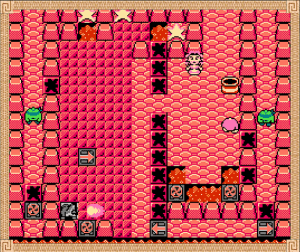 Old School Gamer Magazine chats with “Little Medusa” artistHari Edwin, who lets us know the creative process behind Mega Cat Studios latest NES game.
Old School Gamer Magazine chats with “Little Medusa” artistHari Edwin, who lets us know the creative process behind Mega Cat Studios latest NES game.
Old School Gamer Magazine: How was this game born?
Hari Edwin: We love retro gaming wanted to make an NES title with more puzzles. We worked through some ideas that we think gamers would be looking for but haven’t seen much of, that we’re also passionate about. We decided to combine puzzle gameplay with a Greek mythology spin that wasn’t just about a legendary hero, instead, it focuses on Gorgons and the idea of Medusa.
OSGM: What has development been like so far?
Edwin: Tough but fun! As always, retro development is tricky and uses some older and limited techniques. We’ve had to go back and forth fixing lots of bugs and squeezing in the best features we can on the small cartridge memory size. Going for a bright and colourful style has been a challenge with NES’ tight colour restrictions, but I think we’ve managed to make the most of it.
 OSGM: What makes this game special?
OSGM: What makes this game special?
Edwin: The art style is unique, and the game play gets progressively challenging with all new mechanics through each world. I think it’s special just for being a modern NES game still, and it’s wonderful seeing so much activity for the console! With the popularity of the mini NES and SNES, there are people looking for modern retro experiences where there aren’t many games to satisfy that need. Hopefully Little Medusa can hit the spot for them!
OSGM: What games influenced this one the most?
Edwin: We noticed there weren’t many more puzzle games in the style of Kickle Cubicle, and that the cute classic style you’d see in Kid Dracula is rarer now. Kickle Cubicle inspired the gameplay and the chibi style drove the art direction. Adventure’s of LoLo is a personal favorite as well.
OSGM: Any fun stories or wild moments during development?
Edwin: Grizzled, old guard, ancient gamer team members warring against fledgling, forward-thinking, handsome gamers (me) on how fast the annoying snake enemy should be able to kill you and ruin everything. There have also been some debates on who the best apprentice deity is, I’m partial to the cute water goddess Poisedenna and the rugged earth god Syfri myself. But there are plenty of big little Medusa fans on the team.
OSGM: Do you think preserving older gameplay mechanics in new games is important?
Edwin: Of course, and a lot of the game’s mechanics are older ones. But I think it’s our duty to improve some of those mechanics too, for example smoothing out movement and handling, or making puzzles less archaic and more sensible. I think the modernised retro mechanics will be more fun for everyone while still retaining a classic feel.
OSGM: What’s your favorite memory as a gamer?
Edwin: I have good memories of tough parts in games that I’ve been struggling against but have taken time to learn and master, where I’ve been rewarded with the satisfaction of finally overcoming them. I think there are definitely some moments like that in Little Medusa. Couch co-op games are my favorite type of game though, and I have a lot of good memories from those games. So we’re aiming to make local co-op a big part of the next game.
OSGM: Who will enjoy this game the most?
 Edwin: Someone looking for a fun challenge as some levels really test either your skills with handling enemies and action, or your puzzle solving abilities under a time limit. Also, anyone who’s really into Gorgon culture.
Edwin: Someone looking for a fun challenge as some levels really test either your skills with handling enemies and action, or your puzzle solving abilities under a time limit. Also, anyone who’s really into Gorgon culture.
OSGM: How do you want this game to be remembered?
Edwin: As a game that pushed the limits of the NES to provide a modern gaming experience in a retro package. I hope people can enjoy the characters too, I’m kind of eager to see if there’s any submitted fan art. I really, really enjoyed working on this game, and giving it some personality after the concept was created.
OSGM: What’s next?
Edwin: This year is all about closing out what’s been started, and moving forward away from our retro roots. We want each game to show the growth and evolution of who we are, and contribute games that the community can really enjoy until the end.
_________________________________
Patrick Hickey Jr. is the author of the upcoming book, “The Minds Behind the Games: Interviews With Cult and Classic Video Game Developers,” from McFarland And Company. Featuring interviews with the creators of 36 popular video games–including Deus Ex, NHLPA 93, Night Trap, Mortal Kombat, Wasteland and NBA Jam–the book gives a behind-the-scenes look at the creation of some of the most influential and iconic (and sometimes forgotten) games of all time. Recounting endless hours of painstaking development, the challenges of working with mega publishers and the uncertainties of public reception, the interviewees reveal the creative processes that produced some of gaming’s classic titles.





You must be logged in to post a comment.